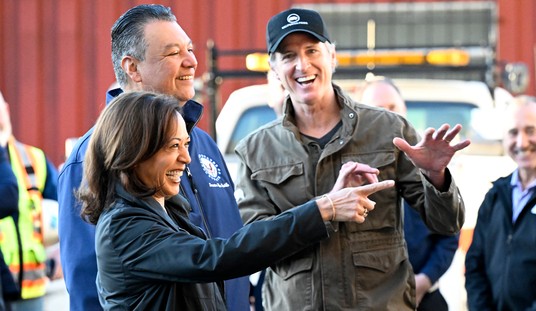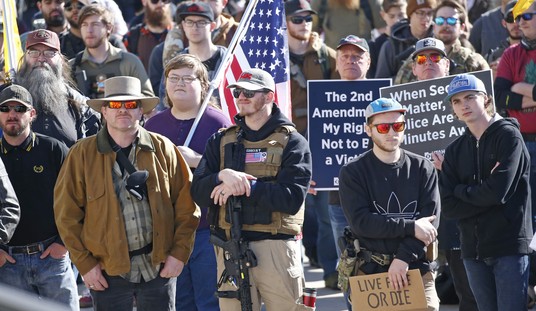On Thursday, in a memorandum to Congress, President Trump has called for a formal "non-international armed conflict" against Venezuelan drug cartels. The War Department has been engaged in interdicting and destroying suspected Venezuelan drug smugglers in the open ocean, and this would seem to place an official approval for those actions - or, at least, an official notification to Congress.
🚨 BREAKING: Trump admin tells Congress that US is now in 'non-international armed conflict' with drug cartels designated as terrorist organizations pic.twitter.com/prH6ATwUQl
— Fox News (@FoxNews) October 2, 2025
A Fox News piece on the matter has only a few more details:
"The President directed these actions consistent with his responsibility to protect Americans and United States interests abroad and in furtherance of United States national security and foreign policy interests, pursuant to his constitutional authority as Commander in Chief and Chief Executive to conduct foreign relations," the memo states.
The Trump administration would seem to be wandering into uncharted waters here. While the drug cartels may have the eye-wink approval of the Venezuelan government, they are not an official branch of Maduro's dictatorship, merely a criminal organization to which it's in El Presidente's interest to turn a blind eye.
There may be a historical precedent, though, back in the very early years of our republic, when Thomas Jefferson was president: The Barbary pirates. These were pirates and slave-traders, operating out of Tripoli in what is now Libya. They were in the habit of collecting monetary tribute from ships passing through the Mediterranean, and when President Jefferson, in 1801, told them where to stick their tribute demands, the pasha of Tripoli declared war on the United States.
Here, the analogy falls apart a little bit; while these were pirates, they were supported by an actual national ruler, the pasha of Tripoli. But there's an argument to be made that any nation ruled by pirates is indeed not a legitimate nation, but simply a cartel of another, larger form.
President Jefferson wasn't deterred, and in what became known as the First Barbary War, he sent a squadron of U.S. Navy ships to the Mediterranean to show the pirates the "or else." The fighting went on until 1804, when a young American lieutenant, Stephen Decatur, led a detachment into the harbor of Tripoli to destroy the captured U.S. frigate Philadelphia. It is from this episode in American history that the Marine Corps anthem derives the line, "...to the shores of Tripoli."
Read More: US Dusts Off War Plans Against Venezuela As Caribbean Troop Build-Up Gains Velocity
JD Vance Gives the Best Reason Ever Why Military Strikes Against Drug Runners Are Legitimate
We should note that President Trump has not, as yet, invoked this as a precedent or justification, and a New York Times piece on Thursday has raised some legal questions as to the move.
Geoffrey S. Corn, a retired judge advocate general lawyer who was formerly the Army’s senior adviser for law-of-war issues, said drug cartels were not engaged in “hostilities” — the standard for when there is an armed conflict for legal purposes — against the United States because selling a dangerous product is different than an armed attack.
Noting that it is illegal for the military to deliberately target civilians who are not directly participating in hostilities — even suspected criminals — Mr. Corn called the president’s move an “abuse” that crossed a major legal line.
“This is not stretching the envelope,” he said. “This is shredding it. This is tearing it apart.”
Note that Mr. Corn is not in any official position. It's likely that the president has at least consulted with his own legal advisors before issuing this memo. And, we should note, the United States carried out a similar war against a non-national entity very recently: Al Qaeda.
After the terrorist attacks on Sept. 11, 2001, when the United States went to war against Al Qaeda — a nonstate actor operating across multiple countries — some legal scholars objected that the country was stretching the rules to justify using wartime powers against a group they likened more to a criminal band of pirates.
But the Supreme Court found that the conflict with Al Qaeda was a real war. It blessed as lawful the Bush administration’s use of the wartime power to hold captured Qaeda members in indefinite detention without trial, while also saying the government was bound by the Geneva Conventions to treat such prisoners humanely and not torture them.
This will likely be taken to the courts, and again, may proceed to the Supreme Court, as did the Al Qaeda case. But one would think at the very least, the actions of the cartels would be akin to piracy, aggressive actions against a target nation by a non-state actor, and therefore the cartels are eligible to be placed in the crosshairs of the United States armed forces.
One wonders, what would Thomas Jefferson have done?
Editor’s Note: The Schumer Shutdown is here. Rather than put the American people first, Chuck Schumer and the radical Democrats forced a government shutdown for healthcare for illegals. They own this.
Help us continue to report the truth about the Schumer Shutdown. Use promo code POTUS47 to get 74% off your VIP membership.















Join the conversation as a VIP Member